Meyer Burger Bundle
How Does Meyer Burger Thrive in the Solar Industry?
Meyer Burger Company has strategically transformed itself into a leading force in Meyer Burger SWOT Analysis, moving from equipment supply to a vertically integrated manufacturer. This shift, fueled by innovative technologies, has positioned the company at the forefront of the global push towards sustainable energy. Understanding Meyer Burger's operational model is key to grasping its influence and future in the dynamic solar energy market.
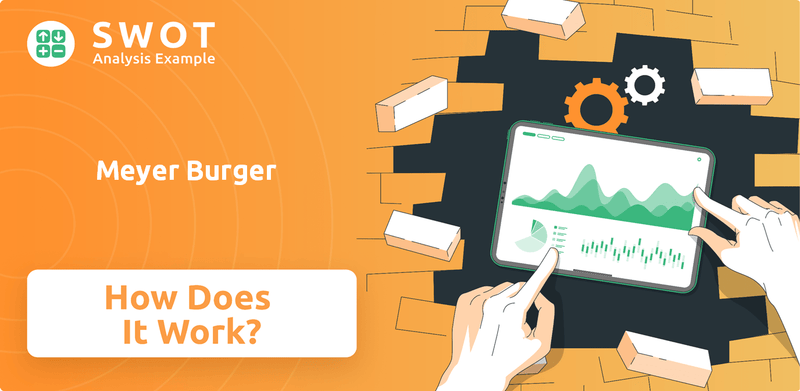
This deep dive into Meyer Burger's operations is essential for anyone looking to understand how it navigates the complexities of solar panel manufacturing. We'll explore its proprietary heterojunction technology and its impact on solar cell production, as well as its commitment to sustainable manufacturing practices. Furthermore, we'll analyze Meyer Burger's global presence and its contribution to renewable energy, offering valuable insights for investors and industry watchers alike.
What Are the Key Operations Driving Meyer Burger’s Success?
The core operations of the Meyer Burger Company revolve around the development, manufacturing, and sale of high-performance solar cells and modules. Their approach is vertically integrated, allowing control over the entire value chain, from cell production to module assembly. This control ensures optimal performance and quality, setting them apart in the solar panel manufacturing industry.
They serve various customer segments, including residential, commercial, and utility-scale solar projects. Their products are known for superior efficiency and durability, aiming to maximize energy yields. This focus on quality and performance is central to their value proposition within the solar energy market.
The operational processes include advanced manufacturing facilities, sophisticated research and development, and a robust sales and distribution network. Their supply chain emphasizes high-quality materials, with a focus on European production to mitigate geopolitical risks and enhance supply chain resilience. This strategic approach underscores their commitment to sustainable and reliable solar cell production.
The manufacturing process at Meyer Burger involves advanced technologies like Heterojunction (HJT) and SmartWire Connection Technology (SWCT). These technologies enhance the efficiency and performance of their solar modules. Their facilities are designed for high-volume production while maintaining stringent quality control.
The value proposition centers on providing high-efficiency solar modules that offer increased electricity generation and a lower carbon footprint. This translates to enhanced return on investment for customers. They focus on long-term reliability and performance, backed by strong warranties and customer service.
The combination of HJT and SWCT leads to higher energy yields compared to conventional solar technologies. Their modules are designed to capture more sunlight, resulting in greater energy production over their lifespan. This innovation gives them a competitive edge in the market.
Customers benefit from increased electricity generation, leading to a better return on investment. The durability and efficiency of their modules ensure a longer lifespan and reduced maintenance costs. Their commitment to quality and sustainability aligns with the growing demand for green energy solutions.
Their operational strategy includes advanced manufacturing, R&D, and a strong supply chain. They focus on European production to reduce risks and ensure resilience. This approach supports their commitment to sustainable manufacturing practices.
- Advanced Manufacturing: Utilizes cutting-edge technologies for high-efficiency solar modules.
- Research and Development: Continuous innovation to improve solar cell efficiency and performance.
- Supply Chain Management: Emphasis on high-quality materials and European production.
- Customer Focus: Providing high-performance, durable, and efficient solar solutions.
Meyer Burger SWOT Analysis
- Complete SWOT Breakdown
- Fully Customizable
- Editable in Excel & Word
- Professional Formatting
- Investor-Ready Format
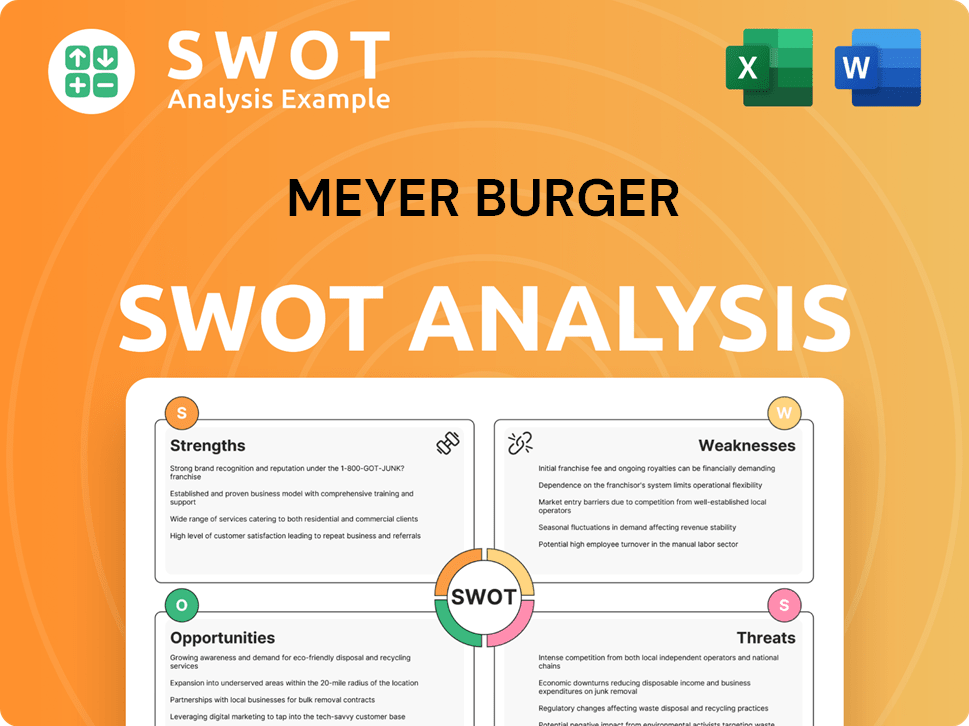
How Does Meyer Burger Make Money?
The primary revenue streams for the Meyer Burger Company stem from the direct sales of its high-performance solar cells and modules. As the company increases its manufacturing capacity, module sales are anticipated to be the main driver of revenue. The company strategically focuses on selling premium solar products, which allows them to command higher prices due to their superior efficiency, durability, and sustainable production methods.
The company's monetization strategy is centered on selling premium solar products that command higher prices due to their superior efficiency, durability, and sustainable production credentials. This approach is designed to appeal to customers who prioritize long-term performance and environmental impact. The company is also exploring long-term supply agreements and strategic partnerships to secure consistent demand for its products, further solidifying its revenue base.
In early 2024, the company's financial outlook indicated a focus on increasing production capacity and market share, particularly in Europe and the US. The company's financial results for 2023 showed a net loss of CHF 291.6 million, with sales of CHF 134.8 million, reflecting the ongoing investment phase in scaling up production and market entry.
The main revenue source is the direct sale of high-efficiency solar cells and modules. These products are designed to offer superior performance and durability.
The company aims to sell its products at a premium price point. This strategy is supported by the high efficiency and quality of the solar panels.
Strategic partnerships and long-term supply agreements are being pursued. These agreements are designed to ensure a steady demand for their products.
The company is focused on expanding its market presence, particularly in Europe and the United States. This expansion is part of its growth strategy.
The company emphasizes sustainable manufacturing practices. This focus enhances the appeal of their products to environmentally conscious customers.
Continuous innovation in solar panel technology is a key aspect of their strategy. This innovation helps maintain a competitive edge in the market.
The company's financial strategy involves a mix of premium pricing, market expansion, and strategic partnerships. The company is competing in the solar energy market with other players. To understand the competitive landscape, consider reading about the Competitors Landscape of Meyer Burger.
- Focus on Premium Products: Meyer Burger concentrates on high-efficiency solar cells and modules.
- Market Expansion: Key markets include Europe and the United States.
- Strategic Partnerships: Long-term supply agreements are a priority.
- Sustainable Practices: Emphasis on environmentally friendly manufacturing.
- Financial Performance: In 2023, the company reported a net loss of CHF 291.6 million on sales of CHF 134.8 million.
Meyer Burger PESTLE Analysis
- Covers All 6 PESTLE Categories
- No Research Needed – Save Hours of Work
- Built by Experts, Trusted by Consultants
- Instant Download, Ready to Use
- 100% Editable, Fully Customizable
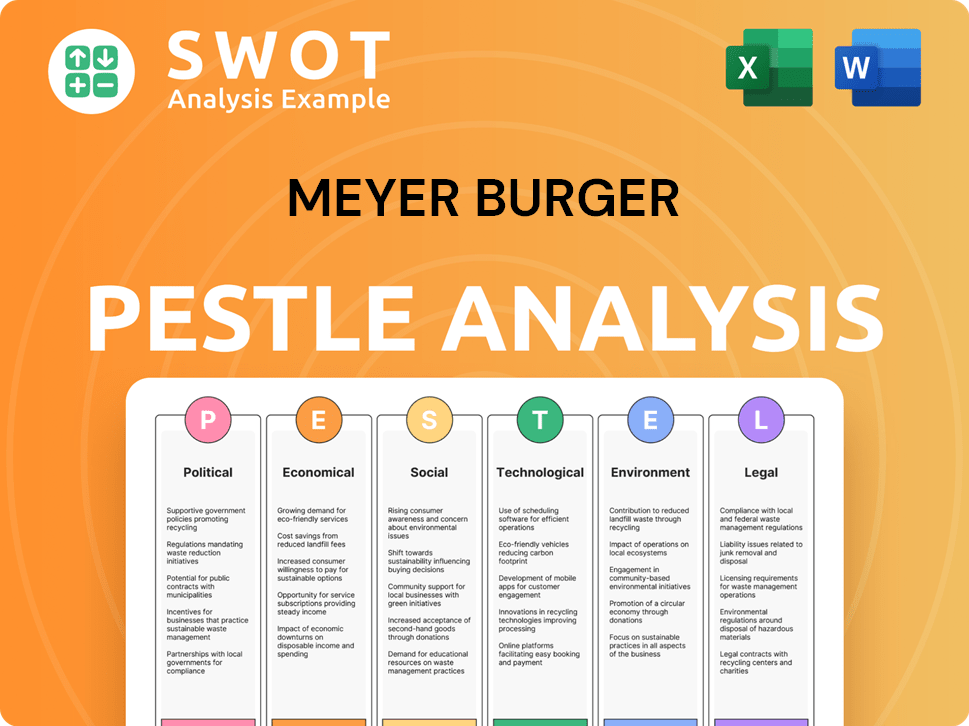
Which Strategic Decisions Have Shaped Meyer Burger’s Business Model?
The transformation of the Meyer Burger Company from a solar equipment supplier to a solar panel manufacturing company marks a significant strategic shift. This transition involved ceasing its equipment business and focusing solely on its proprietary Heterojunction Technology (HJT) and SmartWire Connection Technology (SWCT) solar cell and module production. Key milestones include establishing and ramping up manufacturing facilities in Germany and expanding into the United States.
The company has faced operational challenges, including supply chain disruptions and intense competition from established Asian manufacturers. In early 2024, the company announced a restructuring of its German production, which included the potential closure of its Freiberg module plant. This decision was due to challenging market conditions and a lack of supportive industrial policy in Europe.
Despite these hurdles, Meyer Burger's competitive advantages lie in its technological leadership with HJT and SWCT. These technologies offer higher efficiency and lower degradation rates compared to conventional solar technologies. This technological edge provides a strong brand proposition for premium solar products. The company also benefits from its commitment to sustainable, European-made solar products, appealing to environmentally conscious consumers and policymakers.
Key milestones include the establishment and ramp-up of manufacturing facilities in Germany, specifically in Freiberg and Bitterfeld-Wolfen. The company has also been expanding into the US market. These moves are part of Meyer Burger's strategy to increase its solar panel manufacturing capacity and global presence.
The primary strategic move has been the transition from a solar equipment supplier to a solar panel manufacturer, focusing on HJT and SWCT technologies. This shift includes ceasing the equipment business and concentrating on solar cell production. The company is also exploring new markets, such as the US, and advocating for stronger industrial policies in Europe.
Meyer Burger's competitive edge stems from its technological leadership with HJT and SWCT, offering higher efficiency and lower degradation rates. This provides a strong brand proposition for premium solar products. The commitment to sustainable, European-made solar products also appeals to environmentally conscious consumers.
The company has faced challenges like supply chain disruptions and intense competition. In early 2024, Meyer Burger announced restructuring plans for its German production. The company is adapting by exploring the US market, where incentives exist, and advocating for stronger industrial policies in Europe.
In 2023, the global solar panel market experienced significant growth, with demand driven by increasing renewable energy adoption. Meyer Burger’s financial performance has been affected by market dynamics and production challenges. The company's stock price has fluctuated, reflecting the competitive pressures and strategic shifts within the solar industry.
- The solar panel market is projected to continue growing, with forecasts estimating a substantial increase in installed capacity over the next few years.
- Meyer Burger’s manufacturing facilities are located in Germany and the US, with plans for further expansion depending on market conditions and policy support.
- The company's focus on HJT technology positions it to capitalize on the demand for high-efficiency solar panels.
- The Inflation Reduction Act in the US provides significant incentives for domestic solar manufacturing, which could benefit Meyer Burger's expansion plans.
Meyer Burger Business Model Canvas
- Complete 9-Block Business Model Canvas
- Effortlessly Communicate Your Business Strategy
- Investor-Ready BMC Format
- 100% Editable and Customizable
- Clear and Structured Layout
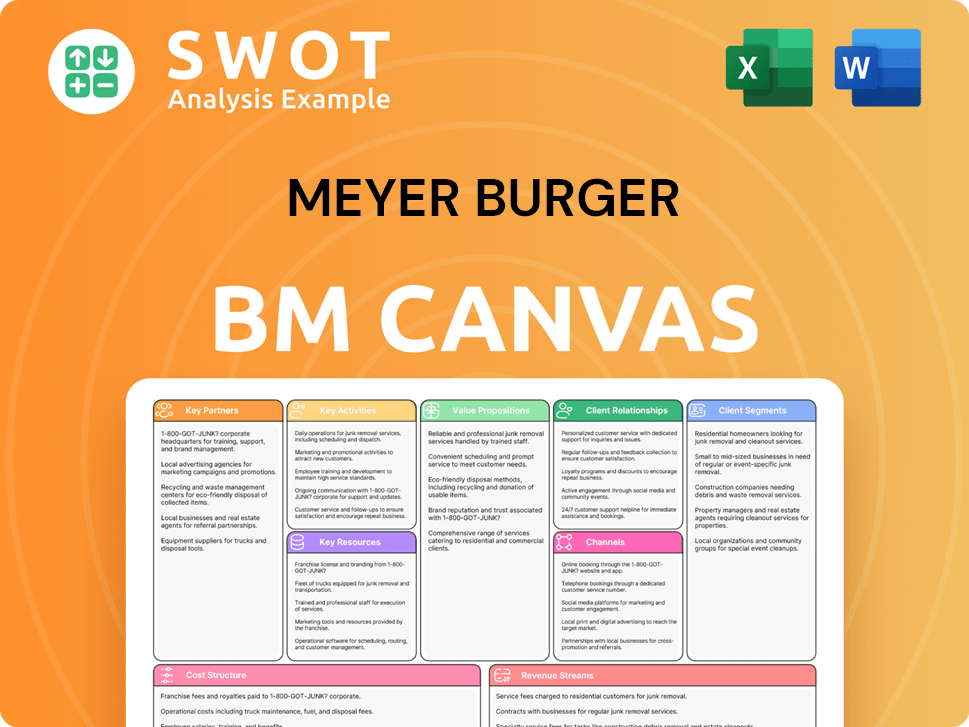
How Is Meyer Burger Positioning Itself for Continued Success?
The Meyer Burger Company carves out a unique niche in the solar industry, aiming to be a leading Western manufacturer of high-performance solar cells and modules. This positioning contrasts with the predominantly Asian-dominated market. Their focus on premium products and sustainable production differentiates them. Customer loyalty is built on the superior performance and reliability of its modules, adhering to European quality standards. They are expanding globally, particularly in the US market, with a significant manufacturing facility planned in Colorado.
Key risks include intense price competition from Chinese manufacturers, fluctuating raw material costs, and geopolitical uncertainties impacting global supply chains. The lack of robust industrial policy support in Europe poses a significant risk, as illustrated by the potential closure of its Freiberg plant. Looking ahead, Meyer Burger focuses on ramping up US manufacturing operations, investing in R&D to maintain its technological lead, and diversifying its customer base to sustain and expand revenue generation.
The Meyer Burger Company is strategically positioned as a premium solar panel manufacturer, differentiating itself from competitors through high-efficiency products and sustainable practices. They focus on markets where premium pricing is viable, such as the US and Europe. This strategy allows them to compete effectively despite the dominance of lower-cost manufacturers in Asia. Brief History of Meyer Burger provides a look at the company's origins and evolution.
The company faces several risks, including intense price competition, especially from Chinese manufacturers, which can pressure profit margins. Fluctuating raw material costs, such as those for silicon and silver, also pose a significant challenge. Geopolitical uncertainties and supply chain disruptions further complicate operations, impacting production and profitability. These challenges require constant adaptation and strategic agility.
The future outlook for Meyer Burger involves expanding its manufacturing capacity in the US to capitalize on supportive policies and growing demand. Investment in R&D is crucial to maintain its technological edge. Diversifying the customer base and expanding into new markets are also key strategies for growth. The company aims to increase production capacity and enhance its market share through these strategic initiatives.
In 2024, Meyer Burger reported significant developments. Revenue increased to CHF 197.9 million, up from CHF 138.6 million in the prior year, showcasing strong growth in the solar panel manufacturing segment. The company is expanding its production capacity in the US to meet growing demand. Despite these positive developments, the company continues to face challenges such as high capital expenditures and intense competition.
Key strategic initiatives for Meyer Burger include the ramp-up of its US manufacturing operations, aiming to benefit from supportive policies and increasing demand. Investment in research and development is ongoing to maintain its technological advantage in solar cell production. The company is also focused on diversifying its customer base and expanding its global presence.
- Expansion of US Manufacturing: Significant investment in the US facility to increase production capacity.
- Technological Innovation: Continuous R&D to improve solar cell efficiency and performance.
- Market Diversification: Expanding customer base and exploring new markets to reduce reliance on specific regions.
- Sustainable Practices: Commitment to sustainable manufacturing processes to meet environmental standards.
Meyer Burger Porter's Five Forces Analysis
- Covers All 5 Competitive Forces in Detail
- Structured for Consultants, Students, and Founders
- 100% Editable in Microsoft Word & Excel
- Instant Digital Download – Use Immediately
- Compatible with Mac & PC – Fully Unlocked
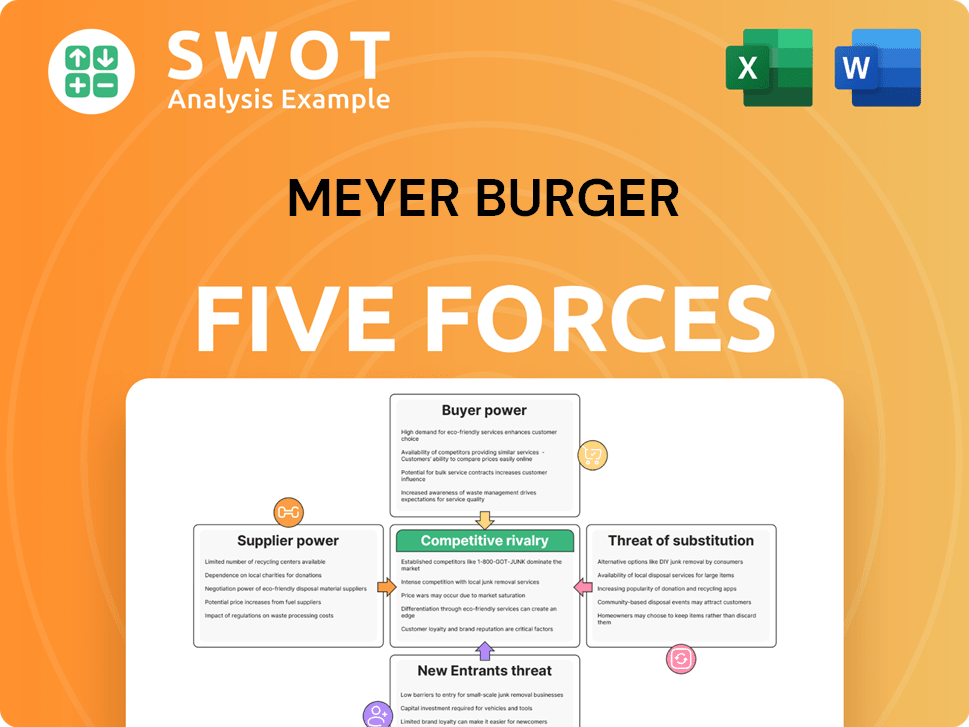
Related Blogs
- What are Mission Vision & Core Values of Meyer Burger Company?
- What is Competitive Landscape of Meyer Burger Company?
- What is Growth Strategy and Future Prospects of Meyer Burger Company?
- What is Sales and Marketing Strategy of Meyer Burger Company?
- What is Brief History of Meyer Burger Company?
- Who Owns Meyer Burger Company?
- What is Customer Demographics and Target Market of Meyer Burger Company?
Disclaimer
All information, articles, and product details provided on this website are for general informational and educational purposes only. We do not claim any ownership over, nor do we intend to infringe upon, any trademarks, copyrights, logos, brand names, or other intellectual property mentioned or depicted on this site. Such intellectual property remains the property of its respective owners, and any references here are made solely for identification or informational purposes, without implying any affiliation, endorsement, or partnership.
We make no representations or warranties, express or implied, regarding the accuracy, completeness, or suitability of any content or products presented. Nothing on this website should be construed as legal, tax, investment, financial, medical, or other professional advice. In addition, no part of this site—including articles or product references—constitutes a solicitation, recommendation, endorsement, advertisement, or offer to buy or sell any securities, franchises, or other financial instruments, particularly in jurisdictions where such activity would be unlawful.
All content is of a general nature and may not address the specific circumstances of any individual or entity. It is not a substitute for professional advice or services. Any actions you take based on the information provided here are strictly at your own risk. You accept full responsibility for any decisions or outcomes arising from your use of this website and agree to release us from any liability in connection with your use of, or reliance upon, the content or products found herein.